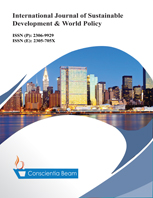Good Governance, Rural Development and Poverty Alleviation in Nigeria: Issues and Challenges
Abstract
Good governance has always been an important issue in global development. Most third world countries have been identified by the World Bank as chronically groaning under the spell of under-development, rooted in corruption and bad leadership. Many ad-hoc solutions embarked upon by various International Organisations have proved insignificant in most African countries. The pseudo-development approaches based on the replication of western mode of development to the developing world have aroused suspicion that the mode of development in the West cannot be used as a basis for engineering growth in other parts of the world, particularly Nigeria. Many studies are conducted in Nigeria to explain how good governance leads to development and poverty alleviation, yet sufficient breakthrough is not achieved. There is need to explore why it is difficult for Nigeria to translate its economic development to enrich its people. This article examines the loopholes in the development priorities of various governments in Nigeria. It is timely based on the recent IMF statistics that Nigeria is now the largest economy in Africa. It examines the impact of development and good governance on poverty alleviation in Nigeria; seeking to explore the potency and place of good governance in poverty alleviation in the largest country in Africa. Relevant literatures were reviewed to closely examine the gap, which ultimately provides rationale for conducting the research. The study, based on the established rapport between good governance, development and poverty, examines the relevance to the Nigeria case. It is therefore premised on the conviction that the three concepts are inevitably intertwined and thus if properly integrated can be employed in studying Nigerian situation and used in the alleviation of poverty.

